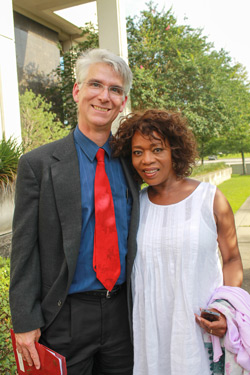TLC was kind enough to supply me with a screener for the upcoming show again this week. Alfre Woodard will be the featured celebrity on TLC’s Who Do You think You Are? this Sunday, August 9, 2015. The episode is scheduled for 8pm/9c.
Actress Alfre Woodard’s grandfather died before she knew him, and his family tree was a mystery. She weny on a journey searching for his roots, and uncovered the triumphant story of her great-grandfather Alec, who endured the horrors of slavery and ascended from servitude to successful landowner, an extraordinary feat of his time.
The episode was filmed from June 14 to 21, 2015. The following cities/locations were visited:
- Alfre’s home, Los Angeles, CA;
- Houston County Courthouse, Perry, GA;
- Woodard land, Houston County, GA;
- Louisiana State Archives, Baton Rouge, LA;
- Jackson Parish Courthouse, Jackson Parish, LA;
- Alec Woodard’s land, Chatham, LA
Award-winning actress Alfre Woodard new a lot about her mother’s family, but her father’s Woodard line was a mystery. Her grandfather, Alex Woodard, died when her father was three, and the family history died with him. All she’d heard is that his family came to Oklahoma from Texas, but she was curious about their earlier origins.
To start her journey, Alfre dug into census records, locating her infant grandfather with his parents (Alfre’s great-grandparents) Alex Woodard, 39, born in Georgia, and Lizzie, his wife. Alfre calculated that her great-grandfather Alex was born about 1841 in Georgia, and suspected he may have been enslaved there – and that “Woodard” was his slave name. Alfre headed off to Georgia see if she could trace her great-grandfather, Alex Woodard’s, trail.
In Georgia, Alfre poured over white Woodard estate records to see if she can locate her ancestor. Alfre found her great-grandfather, Alex, listed as “Alec,” at about age 10, and appraised at $400. The records revealed that Alec’s owner, John Woodard, had died and all of his property – including his eleven slaves – is inventoried to divide among his heirs.
The information did not specify Alec’s biological family, but he was consistently listed with several children. Enslaved people were often sold away from their biological families, so they developed strong kinship networks with other slaves who worked and lived with them.
Alfre saw that Alec was given to a William Woodard, but members of Alec’s kinship network are sold to different owners. The expert promised to look into what happened to Alec once William Woodard claimed him.
The next morning, Alfre drove out to the Woodard land to see where her great-grandfather lived and labored as a slave. As she turns onto the road bordering the land, she noticed the road sign: Woodard Road! Alfre poured a libation on the land her ancestor worked to pay her respects.
Alfre reconvened with the expert, and discovered that Alec moved to Jackson Parish, Louisiana with his slave owner, William Woodard, by 1860.
Alfre followed her great-grandfather to Louisiana. The historian explained that Alec would’ve been emancipated after the Civil War in 1865. Alfre’s journey through her ancestor’s life as a slave was over, so now she wanted to know how he established himself as a free man. The expert explained that 1867 marked the first time black men could vote, but restrictive Southern laws required they pay a “poll tax” to do so. Poll tax rolls reveal that Alec was registered to vote and over the years he ascended from having no property to owning 240 acres of land in Jackson Parish! He was firmly part of the middle class at a time when any amount of land was significant to a former slave living in Louisiana. Owning land was the ultimate goal for every freedman, but only about 25% of them achieved it. Alfre’s great-grandfather accomplished an extraordinary feat. But something was amiss; Alfre then discovered that just a year later, Alec was now paying taxes on only 80 acres, and likely lost some of his land in an economic collapse.
Next, Alfre examined an 1898 land deed from Alec Woodard and his wife Elizabeth, to Aaron Stell. Alfre saw that after Alec purchased land in Texas, he sold his Louisiana land to this man Aaron Stell for just $35 – but why so cheap? Alec sold the property with his wife Elizabeth (Alfre’s great-grandmother) and in fact, Aaron Stell was Elizabeth’s brother. Alec was doing well enough in Texas that he’s giving his brother-in-law the “family discount” on his Louisiana land.
Alfre drove out to the rural, thickly wooded plot formerly owned by her great-grandfather in Jackson Parish. Alfre walked the land and reflected on all she has learned about her impressive great-grandfather Alec Woodard and his resilience that has been passed down through generations.
The following information was discovered, but included not in the episode:
A sales and receipts record revealed Alec and his kin were hired out to different white farmers in Georgia. The expert explained that while Alec was officially the property of William Woodard, he was being temporarily rented to J. Mercer. A significant portion of enslaved people were rented for days, months or years when their owners could not or would not provide for them. Alec’s rate of $48.50 suggests he was rented for a full year. The following documents shows that after a year of being rented to J. Mercer, Alec was being reclaimed by William Woodard. Alec was roughly 17, and he and his kin were now being permanently separated among the estate heirs.
On her great-grandfather’s former land, Alfre met an 80-year-old African American woman who lived on that corner. Roye said that Stells have lived there as far as anyone can remember, and she’s a Stell by marriage. So Alfre and Roye are kin! Roye told Alfre about growing up on the old farm – picking cotton in the early morning darkness, climbing the pecan trees, and playing among the cows and horses. She said that generations of her family have been proud to own that land, and she hopes it always stays in the family.

